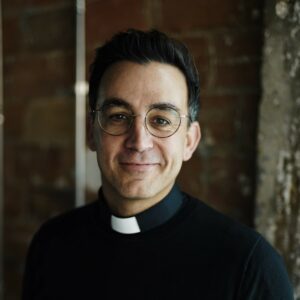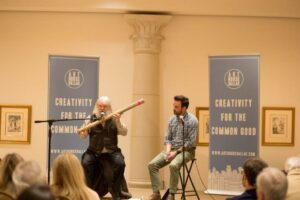Guy+ Delcambre: Spiritual Formation Through Beauty, Art and Creativity
AMIA Communications

Guy+ Delcambre
“We want to use different forms of art and beauty to reinforce and support the theological formation that’s happening,” says Guy+ Delcambre. It’s a vision he brings to two complementary roles at the intersection of creativity and faith. And it’s one he approaches with a passion for authentic community and hospitality.
Guy+ served as a church planter and as the pastor of a local church for 12 years but stepped away in the wake of sudden loss. In 2009, as part of processing his grief, he began working on a book—a writing project larger than any he’d undertaken to that point. In that time a friend suggested that he check out a relatively new addition to his community: Art House Dallas.
The organization began as a spinoff of Art House America in Nashville, founded in 1991 by musician Charlie (Peacock) Ashworth and writer Andi Ashworth when they opened up their home to the local artist community as a hub for rich hospitality, conversations and creativity in community. Inspired by that vision, in 2008 Art House Dallas was birthed with a desire to reach the many creatives who had come to the area to pursue their crafts and build careers. It now produces and hosts an average of 80 events every year, mostly for a community of over 450 artists from across the Dallas-Fort Worth area.
Guy+ quickly got involved and soon was leading programs such as small groups for artists. Two years later, he met Marissa, who at the time was serving as the programs manager at Art House Dallas. A year after that, they married, and since then they’ve worked together to continue to build the community, with Marissa now filling the role of Executive Director and Guy+ as Director of Spiritual Formation. “It’s been our friend circle; it’s been our creative network,” Guy+ shares. “It’s just a very rich community for us.”
“The organization certainly is Christian in its values, but we thought it was going to position us in the most missional way if we just said, ‘You know what? We want the art to be about truth, goodness and beauty, and we want that to be enough,’” Guy+ explains. “Art should be honest; it should be pure. Rather than being fit into a label of ‘Christian,’ we hold that beauty correlates to the other transcendental values of goodness and truth.”
By recognizing the value of art apart from an agenda, Art House Dallas has created an environment of hospitality. “We do want a person to feel safe and to be in a place where there are hardworking artists,” Guy+ says. “They’re good at their craft … and honest about what they do.”
This authenticity has earned Art House Dallas trust that enables them to partner with entities that hesitated to work with a Christian organization. As they’ve worked within underserved communities over the course of several years, they’ve demonstrated that they do what they say they do—that their art programs aren’t a cover for covert evangelism.

Malcolm Guite presenting at the Origin series
One program, however, is explicitly Christian. The Origin series connects spiritual formation, imagination and the arts with the ultimate intent to establish a sacred perspective on how we individually and collectively live and create. Through gatherings featuring speakers, presentations and facilitated discussions, the Origin community explores a chosen topic.
In 2023, the group delved into the ideas of mortality and human finitude based on Psalm 90:12, with guests such as a C. S. Lewis scholar and a cardiac intensivist. In 2024, the program will focus on embodiment, with speakers including poet and priest Malcolm Guite and a Fuller Seminary professor.
Partnering with Art House Dallas in this program is AMiA church All Saints Dallas, which provides funding and will host the opening session of the upcoming Origin season. In addition, parishioners from All Saints volunteer with Art House’s outreach program, Deploy, which sends artists into other nonprofits that work with kids, many from immigrant families, in under-resourced parts of the city. Some are artists and lead workshops, while others go to help those who lead and interact with the young people who attend and their families.
This partnership provided Guy+ and Marissa with an introduction to All Saints, and the couple soon became part of the church. It also soon led to a new ministry role for Guy+.
Dustin+ Messer, vicar of All Saints, knew that Guy+ had experience as both a pastor and an artist and asked him to serve in both of those roles within the church—a congregation that has up to 30 artists among its membership. “There’s a pretty decent constituency of artists who call All Saints home, and they need to be pastored,” Guy+ explains. “Those artists need to also be valued and be affirmed in their vocation from their own church.”
As Arts and Pastoral Care Director at All Saints, Guy+ aims to guide people into the realities of the Christian experience in daily life. “The vision that I’m operating out of for the local church is to begin to define and elevate art and beauty.” He sees aesthetic values as theologically formational qualities that can shape the lives of parishioners.
This vision takes numerous forms. “That looks like involving different forms of art in the liturgy of our Sunday Eucharistic service, like involving poetry or, instead of just reading the Psalms, having a trained vocalist chant the Psalms. And it’s just elevating different art forms within people so that whether they’re artists or not, they’re all being engaged; the imagination is being engaged like the intellect is being engaged.”
Guy+ encourages those looking to incorporate creativity into the life of their church to start small and recognize forms of art that are already present. “If it’s an Anglican church with a liturgy, they’re already encountering different art forms just in the form of liturgy itself, mostly literature and poetry. They’re singing songs also. So just the recognition of that would be the easiest base starting point.” He also suggests book clubs and the use of poetry and quotes from authors like C.S. Lewis in sermons, newsletters and other communications. “Those are really easy ways to push people toward being enriched by the arts as they’re sitting in the pew.”
Guy+ describes the value of the arts as “an engagement of imagination.” He explains that while young children tend to use their imagination often and with energy, as we grow older, we tend to engage our imaginations less and less, and engage the world primarily through rational thinking and logic. As, a result, Guy+ says, “a person’s world can become rather bleak and flat and inanimate.”
He offers a reminder of the literary forms found in Scripture, including the large portions of the Old Testament written in poetic form. “The ancient mind, that is, not a Western mind, is thinking in allegory, not in rational, linear, angular ways. … The more a person can engage and enliven their own imagination, the better grasp they’re going to have on the world that the Bible exists in and came out of.”
He continues, “Whenever a church does that and then helps the parishioner understand why the imagination is so important. … That’s not about promoting an arts ministry as much as it is leveraging the value of what the imagination can bring into a person’s vivid, growing world as a Christian.”











